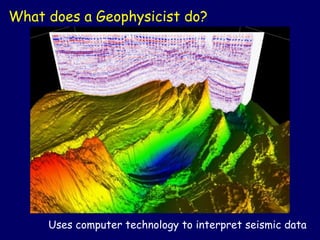All Categories
Featured
Table of Contents
Geophysicist in Mindarie Aus 2021
This work is increasingly contracted out, so consultancies offer another source of employment. Consultancy firms vary in size, from really small business to big multinationals. Some consultancies are quite specialised in utilizing particular geophysical techniques or operating in particular areas, while others use a more diverse series of services to their consumers.
The extraction of gas from landfill websites is another location of employment and this might grow in the future. Exploration business might carry out work for construction firms, public utility, mining business and environmental firms, so geophysicists might be utilized in any of these settings. Other employers consist of: geological surveysgovernment bodies and agenciesuniversities and research study institutes.


Vacancies may be listed in the oil and gas sector press. Recruitment is affected by oil rate changes and the level of competitors for positions varies depending on this. Careers Days, which cover the complete variety of geoscience careers and are normally attended by a variety of key industry employers, are run by The Geological Society.
An Assessment Of Geophysical Survey Techniques ... in Samson WA 2021
Some of the big oil and gas business use a full two-year structured training program across the breadth of geophysics, including the chance to experience operate in different teams prior to specialising in one location. Your training may include work on: existing wellsmagnetic and gravitational potential field data analysisresearchrock analysis. It's more usual for your initial training to be offered on the task.

There might be a probationary duration during which you work along with an experienced colleague. Competency-based appraisals happen regularly in a lot of firms. In smaller companies, and for academic posts, there is not likely to be any formal training - you'll be expected to begin work straightaway and select up skills as you go along.
If you work for a smaller company, you may find that you need to take obligation for setting up and funding your own development and training. If you have a geology degree, subscription of The Geological Society can be useful for networking and for keeping up to date with the industry.
Frequently Asked Questions in Pickering Brook Western Australia 2021
You might also discover it helpful to join the PESGB (The Petroleum Expedition Society of Great Britain, which has a geophysics unique interest group. After a probationary period, and as soon as you've gotten some experience, you might progress to senior geophysicist, then team leader and after that into a senior function in management.
The ease of movement in between functions depends upon the company structure. Research study at Masters or Ph, D level in a subject associated to geophysics or geosciences might assist with your profession development and progression. The employment market within the oil and gas market is extremely based on rate and this might impact your opportunities for profession progression.
For knowledgeable geophysicists, freelance consultancy uses an excellent route for career development. As a geophysicist, you're most likely to have a number of jobs throughout your working life.
Geophysical Methods in Coolbellup Aus 2021
From geophysics, it's possible to focus on seismology (finishing additional training to become a seismic interpreter) or to move into related locations such as engineering geology or risk prediction.
Deciding what to study in college is a difficult option. Even if you know that your field of interest depends on science, what program of research study is right for you? If you make the decision to major in physical and biological sciences and pursue a profession as a geophysicist, you're preparing for an amazing and rewarding occupation.
The very first action to achieving your objective of becoming a geophysicist is making a degree. Even for entry-level positions in the field of geoscience, you'll require a bachelor's degree (a geophysicist college degree) from a certified college or university. Some research positions need prospects to hold master's degrees and even Ph.
Geological And Geophysical Surveys in Armadale Western Australia 2023
Postgraduate degree are particularly essential if you plan to teach at a four-year institution. Geophysicists apply physics concepts and methods to study the gravitational, magnetic, and electrical fields of the earth. This enhances researchers' knowledge of both the world's interior core and its surface. Geophysicists need to have the ability to: examine rocks, pictures, and other pieces of information carry out research study both in the field and in labs develop maps and charts of their findings compose reports To achieve all this, students require a specialized education for geophysicist careers.
As specified above, you'll need a bachelor's degree in geoscience or an associated discipline, such as a physical science or a natural science, to land an entry-level task. Trainees can likewise prepare by majoring in subjects like: Biology Chemistry Computer science Engineering Mathematics Physics The above geophysicist majors provide a more generalized approach to a single scientific discipline, but most programs require trainees to take one or more geology course.
Latest Posts
Geophysical Survey Methods in Champion Aus 2021
Geophysical Survey - Salisbury Archaeology in Hocking Australia 2021
What Can I Do With A Major In Geophysics? in Carine Australia 2023